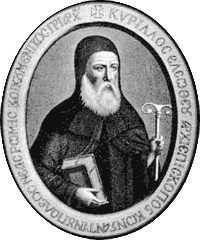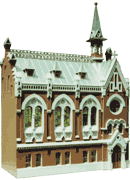HISTORY
|
|
|
[The reports below make clear that a Reformed church existed in Odessa from its founding, that legal documents attest to its existence in 1837, and that the present building on Pastera #63 was built by the church in 1896 as a house of prayer. This same building was still in active use by the Reformed church at least until 1914. The government under Soviet rule closed the church and took this building away, using it for other purposes than the worship of God. When the Presbyterian Church was reestablished in Odessa and appealed for return of the building, it was returned, and is being restored to its former glory.] The Reformed churches of the world are denominated as either Reformed or Presbyterian according to their historical connections with either mainland Europe or Scotland, respectively. Their doctrine and church government are the same, and associations of Reformed and Presbyterian churches exist throughout the world (e.g. in America there exists NAPARC: the North America Presbyterian and Reformed Council). The Handbook of Denominations in the United States states the following: The Reformation-founded churches called Reformed, as distinguished from those called Lutheran, originated in Switzerland under Zwingli, Calvin, and Melanchthon. They were called Reformed in Switzerland, Holland, and Germany; Presbyterian, in England and Scotland; Huguenot, in France; national names, for others in Bohemia and ungary.1 This Reformed Faith was founded in Ukraine centuries ago. For the period 1570-1596 it is stated, "Approximately 100 Protestant congregations exist in Ukrainian lands..."2 Books such as Geschichte der reformierte Kirche in Russland (1863) register many Reformed churches, even in Kherson and Odessa.3 The Reformed Faith did not come into Ukraine from the West alone, but also grew up naturally within the Eastern Church: the well-known Patriarch Cyril I Lucaris of Constantinople (1621-1638) not only had sympathy with the Reformers, but himself wrote a Reformed Catechism. It is morally and legally right that a Reformed church should exist in Ukraine. This fact was supported in July, 1998, by the Ukrainian court when the Evangelical Presbyterian Church was named "the legal and moral heirs" of the Evangelical Reformed congregation founded in the 19th Century. The Evangelical Presbyterian Church of Odessa (EPCO) was registered on May 21, 1996, without pretensions to the present building, having a spiritual purpose of reestablishing the Reformed faith in Odessa. They had much difficulty in finding places of worship, especially due to the decree of the government at that time denying the right of its citizens to use any public buildings as places of public worship. When the history was discovered, a joint request was made by the Evangelical-Reformed Church and the Evangelical Presbyterian Church of Odessa, that the building on Pastera #63 be returned to its rightful owners and to its rightful use. Since many such properties had been returned to other groups, particularly those belonging to the large Orthodox population, it seemed only just that this same attention be turned to Evangelical Christians as well — especially since there did not exist for the citizens and expatriates of Odessa any Reformed or Presbyterian house of worship of any kind. Given the wanton destruction by the government during Soviet times of thousands of church buildings,4 it seemed the moral duty of the government to see that buildings were again supplied to its citizens for the worship of God in the various communions which theretofore existed in Odessa. We feel that this action will surely help contribute to the moral recovery of the Ukrainian nation, and should signal to the watching World that Ukraine is acting responsibly as a democratic nation, defending the rights of all her citizens. |
 Patriarch Cyril Lucaris 1 Frank S. Mead, Handbook of Denominations in the United States (Nashville:Abingdon, 1990), Ninth Edition, p. 210. 2 Osyp Zinkewych and Andrew Sorokowski, ed., A Thousand Years of Christianity in Ukraine (New York: Smoloskyp Pub., 1988), p. 94. 3 H. Dalton, Geschichte der reformierte Kirche in Russland (1863). 4 Osyp Zinkewych and Andrew Sorokowski, ed., A Thousand Years of Christianity in Ukraine (New York: Smoloskyp Pub., 1988). This source documents and lists not only thousands of churches generally, bu lists them by name and city. Among them is a list of Odessa churches destroyed on page 269, and the following general note on page 267: "According to Soviet data, on the territories of Ukraine which became part of the U.S.S.R., 6.371 churches (out of 14.371 in 1914) were destroyed or changed into structures for other uses (jails, schools, clubs, warehouses) during the period 1917-1932... All church communities in Ukraine... were liquidated by 1937." It further explains the State's egoistic selection of destruction or conversion on the same page: "Most of the churches destroyed by the soviets were those built during the period of statehood of Kievan Rus'... Churches built in more recent years, especially those of stone, were converted to other uses." |



